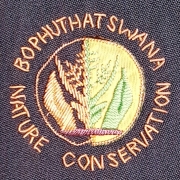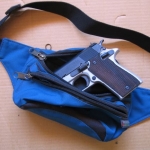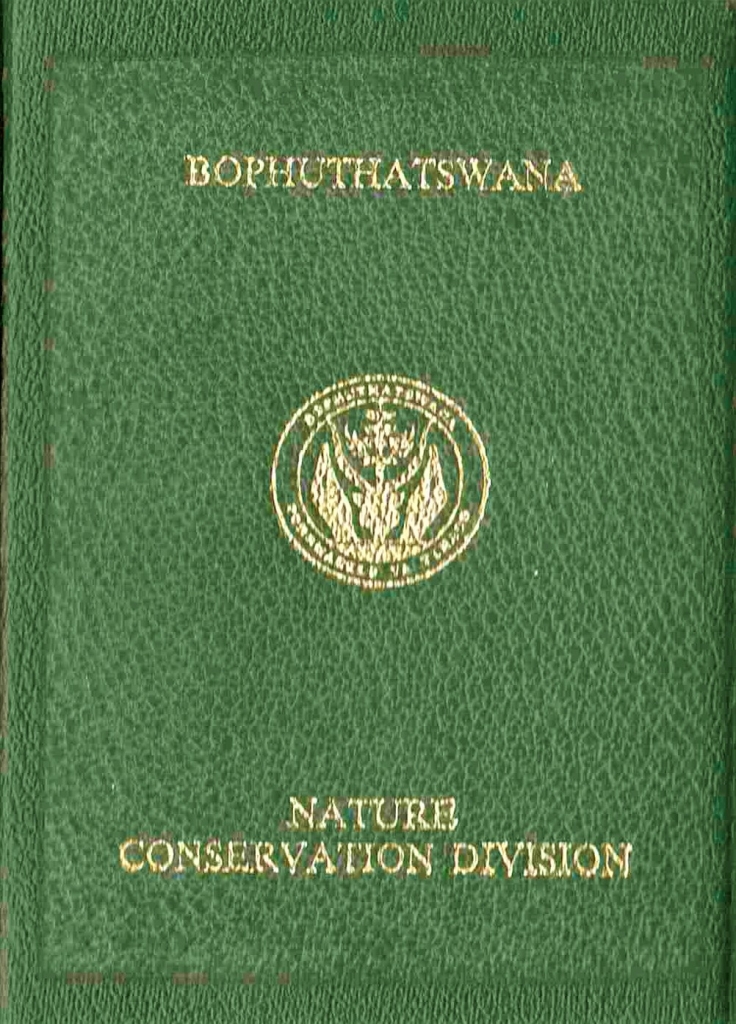
African villages can be fairly small, straightforward collections of mud huts or they can resemble Dickensian tenements inclusive of dimly-lit labyrinths of warrens leading to just about any iniquity you can imagine – it mainly depends on how close they are to the urban sprawl that we have euphemistically come to call civilization. When they border on wild bush they will spawn an outbreak of poaching, especially if they are transient in nature, as with construction camps.
During my tenure in uniform in Bophuthatswana we honestly didn’t concentrate too much effort on the depredations of the local villagers on the resident wildlife population. Firstly it was never of epic proportions, secondly it was mainly for subsistence – food – and lastly, in the case of the witchdoctors, it could have cultural implications. The police were more interested in recovering stolen goods than we were in recovering the pathetic remains of a duiker from a cooking pot, but sometimes we would tag along with the cops or even orchestrated our own nocturnal sweeps to show the flag. It was, after all, not up to us to decide which laws we would enforce.
A brief history here of the independent homelands that were created within South Africa in the late ‘70s. The homelands rapidly became refuges for former Rhodesians who found them much easier-going than South Africa, and there was no need to learn Afrikaans to get by. Residence permits were easy to obtain, and as there were no effective border controls it was a sort of fast track to getting into South Africa.
The homelands were de facto under the fairly rigid control of the euphemistically-named Ministry of Cooperation and Development in Pretoria, and in reality South African police “advisors” ran the police, military “advisors” ran the defence forces, and even cabinet ministers could be “appointed” by the homeland’s president at the behest of Pretoria. These were usually ministers of defence, or other key portfolios which kept the emergent governments under Pretoria’s control. But Pretoria couldn’t prevent the homelands from engaging outside contractors, and if they could hire such expats it gave them more genuine autonomy. Or at least the feeling thereof. So the ingress of such luminaries as Col. Ron Reid Daly, formerly founding commander of Rhodesia’s elite Selous Scouts, was heartily welcomed. It provided genuine expertise without any strings attached.
I later came to know a fellow called Jean-Paul, who had done his thing in the French Foreign Legion, and later soldiered with “Mad Mike” Hoare in the Congo. He’d served in the Rhodesian Light Infantry, and, as was the wont among the men of “the profession” at that time, kept gravitating southward. He’d served at one time under Bob Denard in French-speaking Gabon, as part of President Omar Bongo’s presidential guard, and he was well qualified for that line of work – so he wound up doing the same for Sebe. But the men who would be king in these myriad little republics hadn’t been groomed for the responsibilities of rule by South Africa, and there were power struggles and intrigues aplenty. It was kind of like The Muppet Show with guns and knives. Jean-Paul described his circumspect departure from Ciskei as being under cover of darkness during the dead of one night, bound for the relative safety of South Africa just before one of the night-of-the-long-knives episodes that could erupt so easily (and with Pretoria’s help) in such places. When I knew him he’d more or less hung up his guns and was working in security for Sun City, a large hotel casino – but every now and again we’d invite him along as an honorary officer when we did roadblocks or the like, and it was like twenty years had fallen from his shoulders. He was a true professional.
The Tswana people in Bophuthatswana, on the other hand, were about as easy-going as it is possible to be while you still have a pulse. As long as Pretoria kept paying for everything, there were few grievances, and life was pretty stable under president Lucas Mangope. A year before South African independence, in 1994, there was a serious attempted coup d’etat it’s true, but the homelands were being dismantled then anyway to make way for a smooth transition in South Africa. The Pretoria giveth, and the Pretoria taketh away, and those who had found profitable niches in the fledgling country weren’t too happy about the taketh away part. This had resulted in a civil service strike and a security forces revolt. Mangope really had little control over events, and contingents of the right-wing white Afrikaner Volksfront and Afrikaner Weerstandsbeweging – who weren’t too sure about what was in store in South Africa’s future and saw the homelands as maybe an alternative – moved in to “restore order”. A troop of Boy Scouts would have displayed far more self discipline (and military proficiency), and this was just a big, disjointed shooting party that was soon routed by even the half-hearted response of the Bophuthatswana security forces. Flaring across the world’s headlines, the incident died away in a few days, as did a number of “peacekeepers” on the spot and the Bophuthatswana government some months later.


Against this background a decade earlier, my good friend, Hans Koenig, and I found employment at the beginning of the 1980s. We were not Afrikaners, and so were a prize catch for the chief personnel officer in the Ministry of Agriculture, Mike Rasibitse. We were engaged as Nature Conservation Officers, and given three-year contracts at about twice the salary of our counterparts in the South African civil service, a generous T&S (transport and subsistence) allowance for when we were off station, three-bedroom houses, and vehicles (the latter of which took some time to materialize, but we made do by scrounging). We were issued with uniforms, weapon systems, and blue lights and told to go forth and do whatever it was we were supposed to do. It was immediately clear that the Ministry of Agriculture wasn’t quite sure about what that was, because with one exception all of our other colleagues were employed by the Ministry of Cooperation and Development. We collected copies of the Nature Conservation Act so we could work this out for ourselves.
Financially, it was paradise, and because Pretoria was paying, Mafikeng couldn’t care less. The South African rand, which was the currency in all the homelands as well, was trading on a par with the US dollar at the time, and none of the stringent exchange control regulations in force in South Africa were applied to contractors in the homelands. So the net result was that as long as I got out and did what I had to do, and spent about half of each month on patrol away from station I could live quite comfortably on my T&S, and bank about a thousand bucks a month in hard currency overseas. In addition, there was a generous end of contract bonus, so it was a heretofore once-in-a-lifetime opportunity.

We implemented a vigorous law enforcement programme in our districts, and supplied input for alterations to the Nature Conservation Act and development of the division in the annual budget. This probably annoyed a lot of people higher up the chain, because if we did something it meant they had to do something as well, but the only ones who were really put out were the local South African poachers. We didn’t speak Afrikaans, so we weren’t members of that Old Boys’ Club, and if we caught them they were caught. At the height of apartheid, here were two white guys with guns and badges who didn’t talk the talk or give a rat’s backside that the guy they’d just collected at a roadblock with a poached animal was a colonel in the South African Police or a general in the South African Defence Force, he was under arrest. We once even fired warning shots over a (rapidly-departing) South African police vehicle that had failed to stop. In order to do our jobs properly we had to be loose cannons of a sort and therefore there wasn’t anything in The Rule Book about how to deal with us. (The converse, of course, was that we had to watch our own backs pretty closely when we went across the invisible border for shopping or whatever.)
There were some really fine expats seconded from Cooperation and Development; in particular I recall a South African policeman named Max Berg who was de facto commander of our local police station, as an “advisor”. He was undoubtedly keeping an eye on things for Big Brother, but he took his job of advising and training the local police seriously, and did it conscientiously. He was genuinely well-liked, he was competent, and eager to help. And a good thing he was, too, because at the onset we didn’t have the slightest idea what we were supposed to do or how to do it, and he was very largely our crash-course “police academy”. I will forever be indebted to his patience and sense of humour.
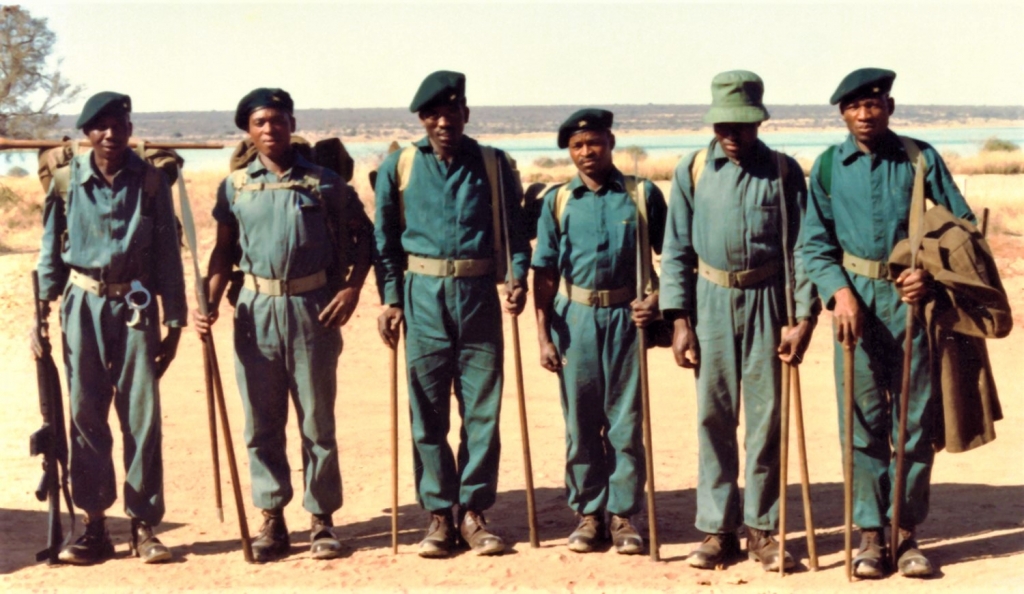
South African – and therefore Bophuthatswana – law was based on the Roman Dutch template, and much beyond “look both ways before you cross the street”, it was markedly different from most of what we knew. But for every expat like Max, there were ten from the Dark Side. Our very own Professor Moriarty was a senior South African military officer, Brigadier Hennie Riekert, who was the Minister of Defence, and realized all too well the advantages of poaching from the Alouette III helicopter. Of course, there was nothing we could have done about it, but we knew about it and could prove it, and that was enough to cause him indigestion. (Later, back in Zimbabwe, I made a good friend, Ian Henderson, who was an ex-Rhodesian Air Force 7 Squadron chopper pilot and who was flying for the homeland defence force around the same time Hans and I were there. Two decades later he told me a lot of scary stories and a lot of stuff I wished I’d known back then! Poaching was the tip of the iceberg.)
Three excellent colleagues, who became good friends, were Greg Jennings, Barry Revell, and Louis Loock, and we more or less made up the Nature Conservation Division.
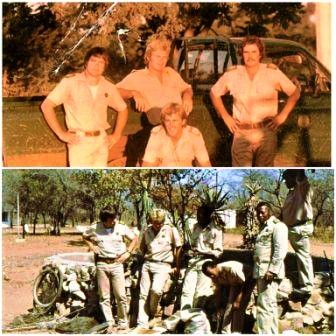
Spending the hours between midnight and first light doing a door to door cordon search of other peoples’ homes was never something that appealed to me. For the reasons I’ve already mentioned it wouldn’t have much impact on wildlife management, but it was something that had to be done from time to time. This tactic was often employed across the border in South Africa because of an ongoing armed terrorist insurgence, and especially in the homelands where law enforcement was less efficient there was always the possibility of uncovering arms caches, or a safe house full of dissidents.
Villages to be searched were identified because of their proximity to parks and reserves, or unusual growth from construction projects, or an increased number of snares and traps being recovered by our Game Scouts on regular patrols. We would usually draw in manpower from a number of districts so that there were four or five officers and three times that many scouts. We would involve the police or the defence force if we had to contend with a really large village, but that was rare. Having worked out a plan from maps of the area, we would station scouts at strategic tracks into and out of the village as stop groups, and then generally sweep through in two groups with one or two game scouts to translate. The average black South African was fluent in his own language, Afrikaans, and a handful of other tribal dialects but in the rural areas English might be a problem, so interpreters were necessary. We would knock on the doors, identify ourselves, enter, conduct a search, and leave. The laws were pretty draconian, and not only did we not require search warrants, we didn’t even need to be able to document prior information from a confidential informant. There was, effectively, no comeback for the villagers in or out of the homelands.
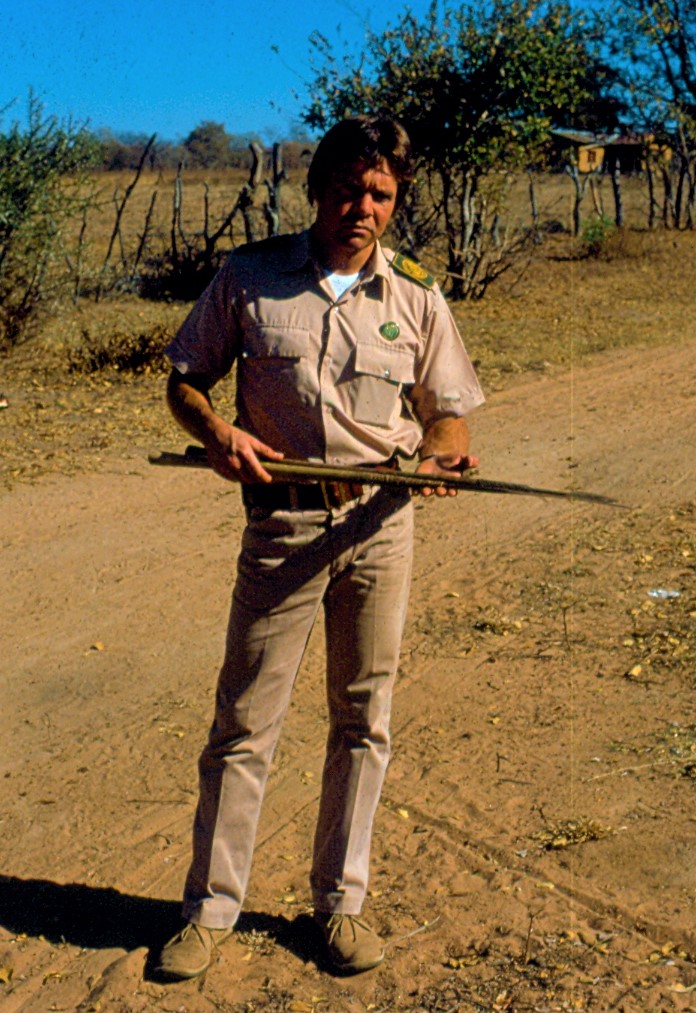
National security was not our mandate, unless of course we stumbled onto something by accident. We were mindful of the situation in South Africa, though it was still a decade and a half before independence. Our policy, therefore was a strict interpretation of the Nature Conservation Act, the use of minimal force, and a civil approach to the villagers. Nobody liked us, which is something you learn to live with in law enforcement, but there was really no point in seriously trying on a hearts and minds approach – we would have been culturally way out of our depth and were overshadowed by what was happening around us anyway. We were merely concentrating on amenity. Walking into someone’s house in the middle of the night wearing a gun because you can always made me feel self-conscious, and I was always fairly happy when the first sparrows began to fart as the horizon began to lighten in the east and we could start wrapping things up.
Our clientele was divided roughly into two categories. Garden-variety poachers were fined unless the offence involved a specially-protected species, in which case we would make an arrest and it would go to court. Toward the end of our tenure we had implemented effective jail terms for poaching such species, such as reedbuck, so it was a serious offence. Trouble was, a snare doesn’t distinguish between a duiker and a reedbuck, but there was nothing anyone but the Goddess of Luck could do about that.
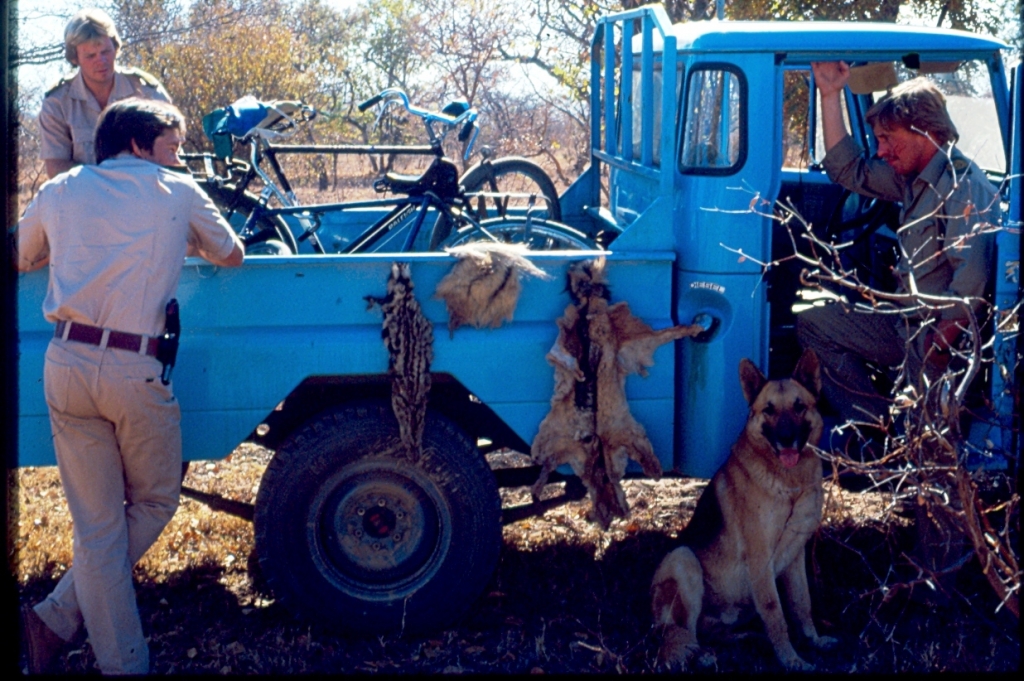
Sangoma, n’anga, call them what you will and witchdoctors by any other name were treated slightly differently. “Civilization” having come to Africa in the form of government administrations, witchdoctors had to be accredited and licensed, which always seemed to me to be a little Gary Larsonesque. The idea of a guy in traditional garb in a mud hut with a practising certificate on the wall appealed to my sense of humour. If a “traditional healer” was not accredited, and was found with animal remains, he was a poacher and dealt with accordingly. If he was licensed, we confiscated his wares until such time as he came to the office, and we would issue him with a free permit and return them.
Fortunately, and probably because of our attitude, there were very few incidents during these searches. Our African game scouts had experienced the ghost of a taste of power through their uniforms and ID cards, and were about as cognizant of the human rights of their fellow Africans as Idi Amin, so we had to constantly keep them in check. This whole “because you can” thing went to their heads pretty quickly. Knives and spears and axes were sometimes forcefully taken away from a few of the more belligerent types who had consumed too much of the local home brew before retiring, but no serious incidents. And alas, nary an arms cache or cell of Cuban revolutionaries to be found anywhere.

One incident that still brings a smile was when I recovered a pair of steenbok horns from one sangoma’s hut. They were tied together with a snakeskin cord and filled with some malodorous substance that was apparently dispensed with the porcupine quills embedded in it. I didn’t want to know any more. Fortunately the fellow was a proper card-carrying witchdoctor, as the steenbok was also specially protected, and I explained through a scout where he could find our offices, and that he must get a permit for them. He muttered darkly that he hoped I would not soon have excruciating stomach pains. The scout replied that prison food could do that too. Impasse resolved, we later became almost friends, and he even turned over a couple of unlicensed practitioners to our scouts at a later stage. (Though undoubtedly from a different agenda.)
To be continued…

